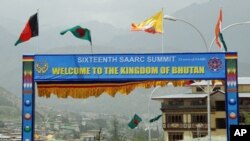Government officials from India and Pakistan confirm their respective prime ministers will meet (Thursday) on the sidelines of a regional summit in the Himalayan kingdom of Bhutan.
In his opening remarks, India Prime Minister Manmohan Singh avoided direct reference to the state of the relationship with neighbor Pakistan. But he expressed frustration with the lack of cooperation among member nations during SAARC's quarter-century existence.
Mr. Singh warned that if the region does not become better connected and better educated, South Asia risks being marginalized and suffering from stagnation.
"The 21st century cannot be an Asian century unless South Asia marches ahead and marches ahead together," said Prime Minister Singh.
Pakistan's Prime Minister, Yousuf Raza Gilani also did not make direct reference to the tense Indo-Pakistani relationship. He did, however, in his speech to SAARC, call for forging a common front among all member countries to combat what he calls "the toxic brew" of extremism and terrorism.
"It has roots in history, in economic neglect and injustice. We need to join hands to fight it individually and collectively," said Pakistan Prime Minister Yousuf Raza Gilani.
The President of Afghanistan, Hamid Karzai, expressed similar sentiments.
"We will not succeed in achieving this goal until all members of SAARC, without exception or reservation, commit not to allow their territories to be used directly or indirectly to shelter or train terrorist networks," Afghan President Hamid Karzai said.
Host Bhutan expressed frustration with SAARC's dearth of notable achievements. Bhutanese Prime Minister Jigmi Thinley blamed the lack of focus on quarrels among neighbors preventing the community from becoming prosperous.
The annual leaders' summit is frequently criticized as a talking shop that adopts ambitious declarations, which have failed to deliver anything substantive for the region's one-and-one-half billion people.





